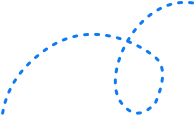The Ultimate Guide To Featured Snippets (OMG Labs) 


This guide explains everything you need to know about Featured Snippets as an organic acquisition tactic. We’ll be covering both the technical and business aspects of feature snippets.
Here’s how OMG labs guides are unique and worth your time
- We produce our own research to backup our claims
- We validate every single recommendation provided
- We offer in depth analysis on commonly misunderstood ideas
- We produce actionable insights anyone can use
Here’s what we’ll cover in this guide.
Definitions & Important Concepts
Why are feature snippets important?
What are the business benefits of feature snippets?
Advice: How to Get Your Content to Appear on Google’s Featured Snippets
SERPs Landscape Audit & Prioritisation
Definitions & Important Concepts
Search Results
Searching for something on Google has almost become a reflex for most of us today. The search engine has continuously improved its functionality, capturing its users attention and interest by developing new and better experiences
Google has evolved into an intelligent search engine that provides several types of search results, many of which are customised, depending on the viewer.
Here’s a list of Google’s Search Results (Last update: Aug 2020)
Plain blue ink: This is the traditional type of result, it includes a title, the URL which could also include a breadcrumb, and a brief description.

Rich results: Google allows you to include corporate logos and links that allow users to search your site from within the search results. The coding of the source page normally requires some sort of structured data to enable enhancements like special visual and graphic elements to make them stand out. Currently Google offers 30 different types of rich results
Knowledge panel: This is a group of results from various sources presented by Google in a panel form with visual elements. It makes it easier for the user to scan the main results with a quick scan or glance.
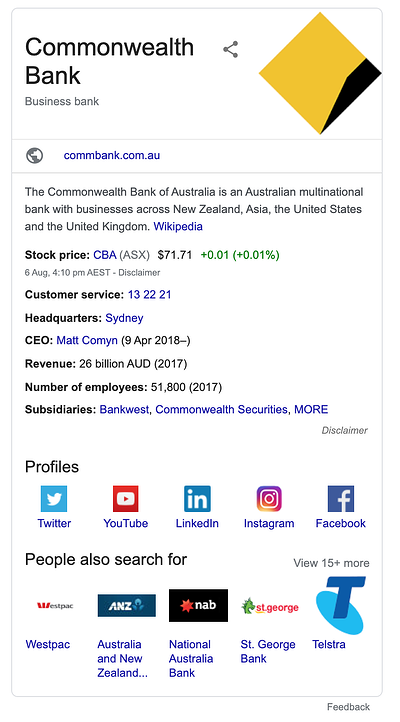
Featured snippets: These are brief snippets of text that are extracted from the source page and displayed in the search results.
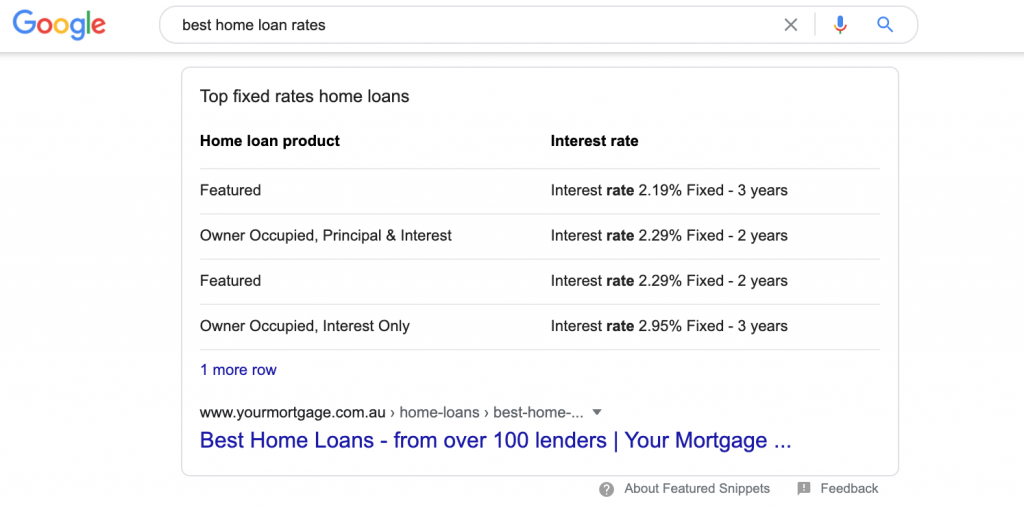
OneBoxresults: These are inline answers to search queries presented in a box. There are fixed types of OneBox results and they cannot be customised.
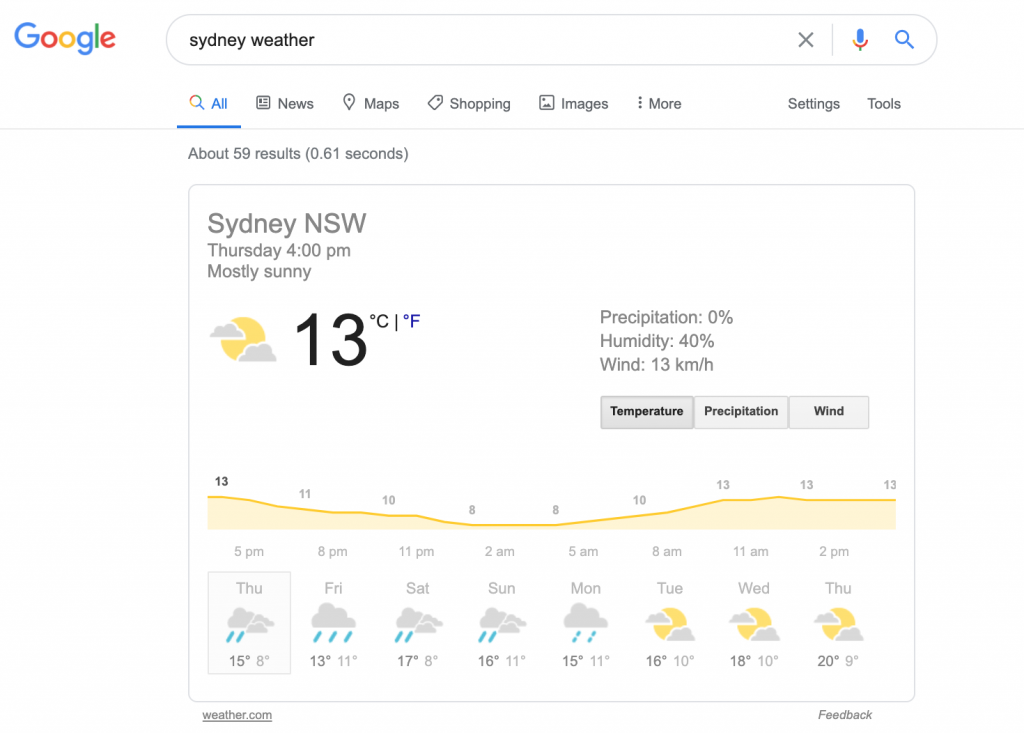
Discover: This is a search feature that is present on Android devices and shows results in a series of scrolling panels.
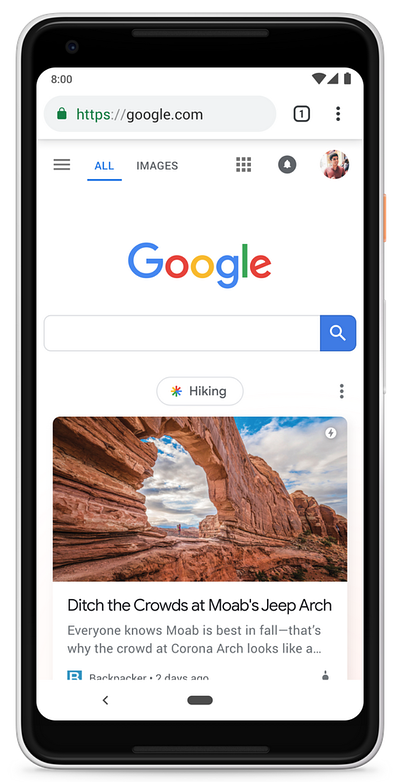
In this guide, we’ll cover everything you need to know about featured snippets.
Let’s get started!
What are featured snippets?
Featured snippets are short fragments of text that briefly answer a user’s query and normally appear at the top of Google’s search results (Position 1).
Google states on its documentation that the selection process of featured snippets is determined by an algorithm and you cannot mark your page to be featured in this type of search result.
Anatomy of a featured snippet
In a snippet, the description appears first in the answer box and the Title & URL below it.
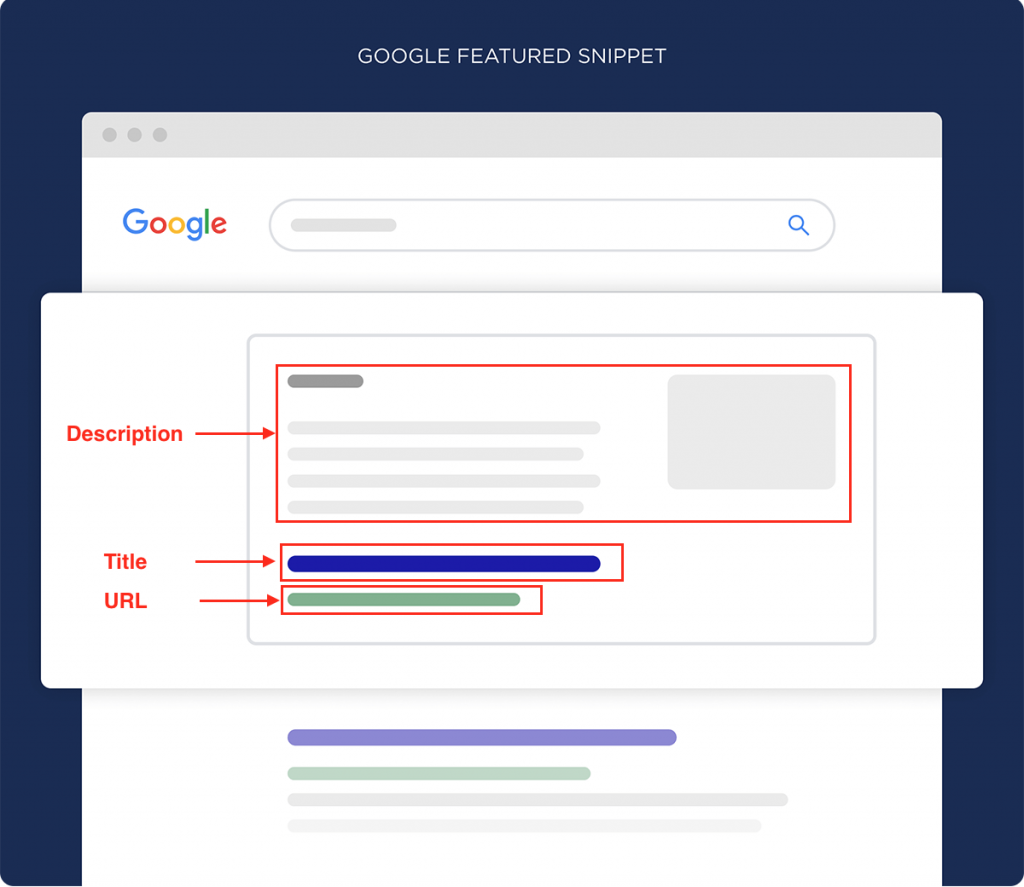
When a user comes across a snippet in an answer box and clicks on it, they are taken to that exact corresponding location within the source page.
If Google’s algorithm cannot determine the exact location, the user is taken to the top of the source page.
Using Nosnippet, Data-nosnippet & Max-snippet
As mentioned before, you can’t force Google to pick your content for featured snippets. However there are some special tags you can use to opt out of it if you want.
- Nosnippet tag blocks all snippets on a tagged page. We don’t recommended you to implement this tag unless you have a good reason i.e content you want to hide for legal purposes
- Content marked by the data-nosnippet tag won’t appear in any type of snippet
- Since a page will appear as a snippet only if there is a minimum length of text available to display, adding a max-snippet tag with a low value to your source page code will prevent it from appearing as a snippet. According to Google, “ In general, the shorter your max-snippet tag setting, the less likely the page will appear as a snippet.”
Types of feature snippets
There are different types of snippets, tailored to suit the user’s query (Last Updated: August 2020)
Text or paragraph snippets: these are excerpts of text from the source page and answer a user’s search question. If the content on the source page answers common questions precisely, good semantic signals and a good structure, it has an increased chance of appearing as a paragraph snippet in the answer box.
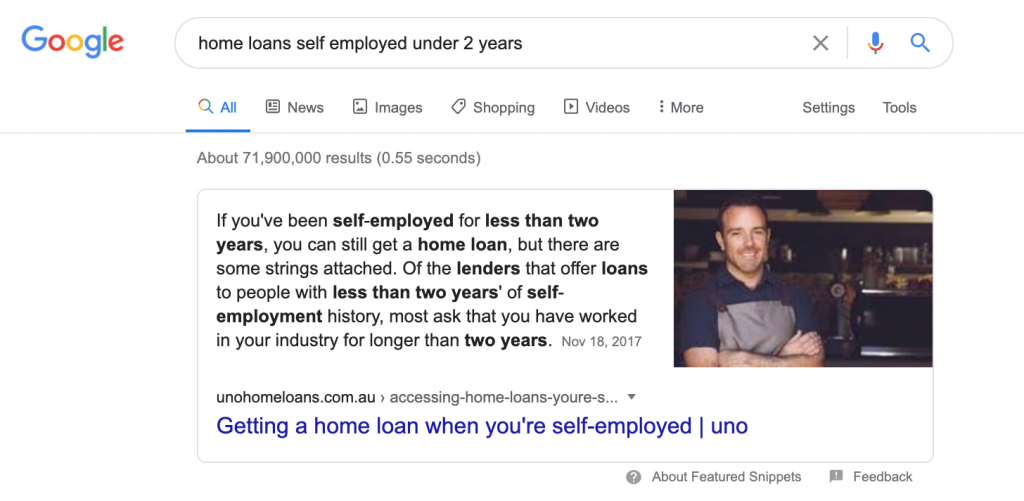
List snippets: These types of snippets can be numbered or bulleted.
- Numbered lists appear as step-by-step instructions, typically for recipes and projects.
- Bulleted lists display items that are in no particular order like “best of” lists, for example.
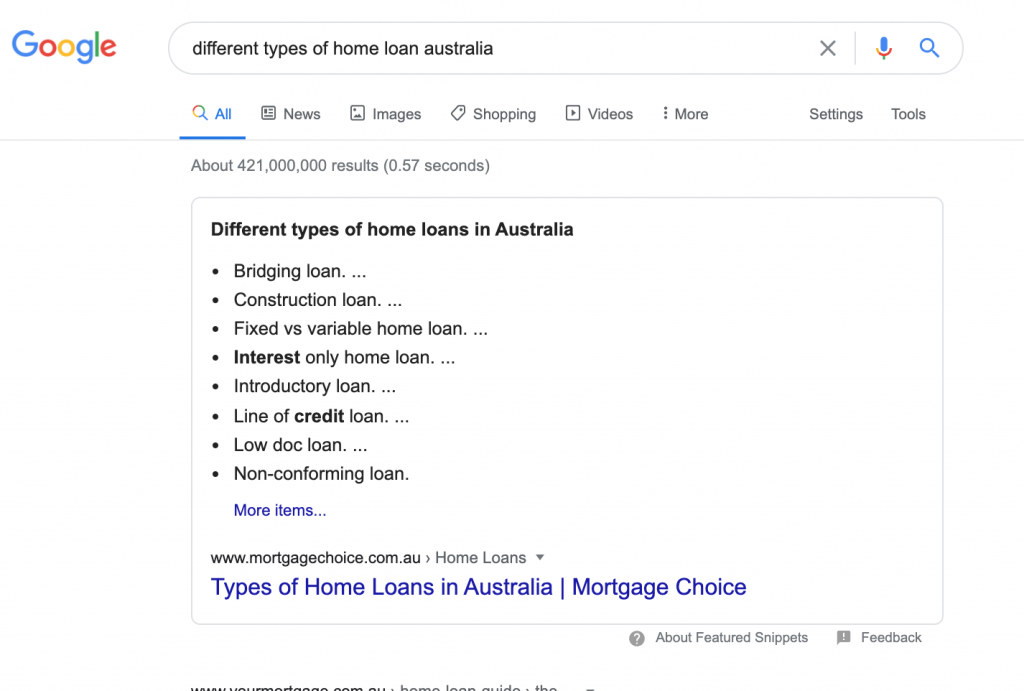
Table snippets: Google gets this information from html tables and sometimes pulls specific information the user is looking for, and creates its own table.
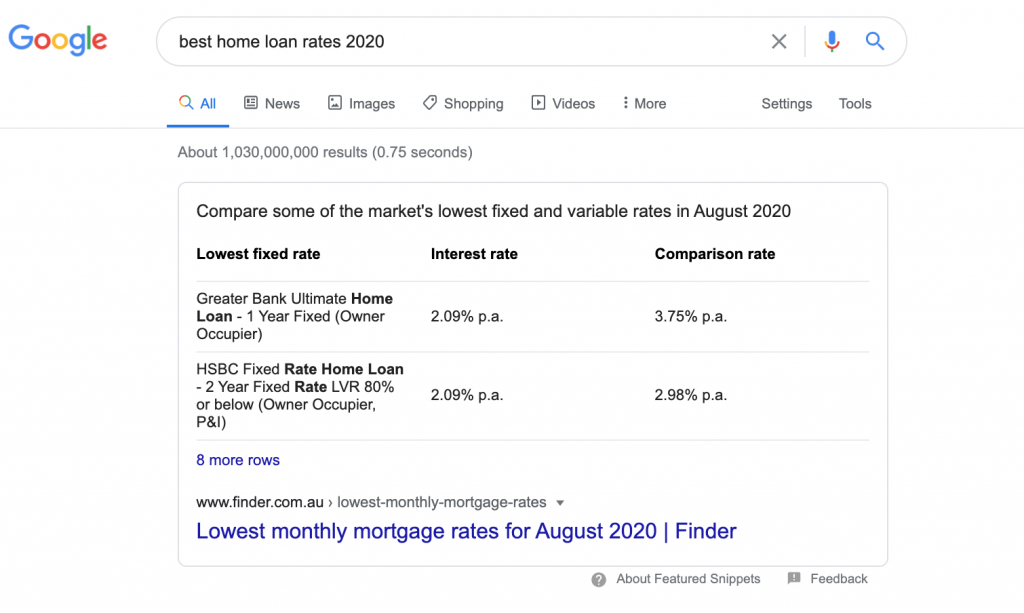
Video snippets: Content pulled from YouTube. It can include a section from the video itself or a text from the video description.
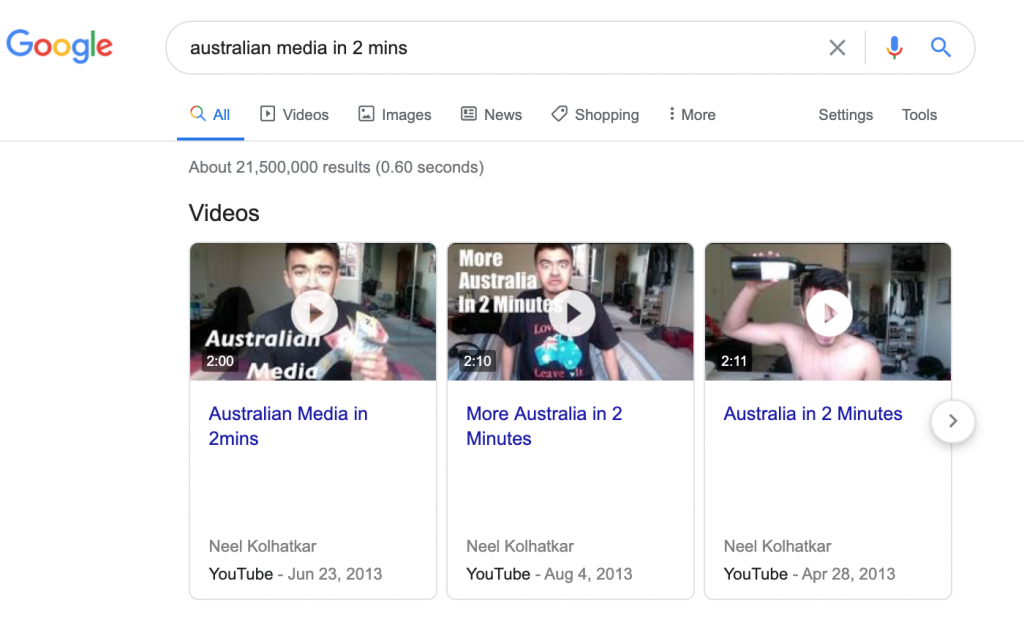
Two-for-one snippets: Relatively the newest ones, Google is still experimenting with these ones. These snippets are created by Google when it combines two sources in a single result, like a text from one source with a video from another.
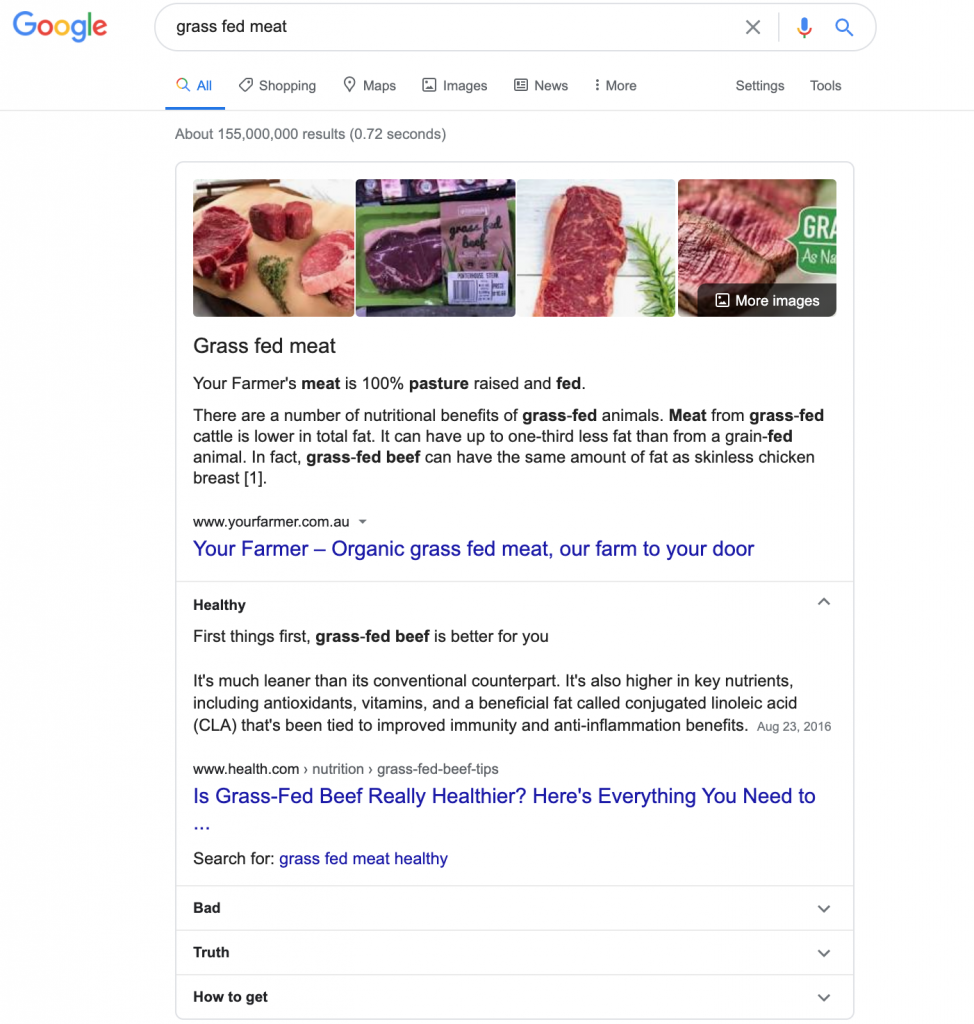
How feature snippets work
Feature snippets contain a third party website snippet with a brief description, the URL and a title. For every search query, Google’s algorithm chooses the best match to answer the query and presents it as a feature snippet in the search results.
Guidelines Violations
Featured snippets will be removed if they violate Google’s policies. The algorithm has a built-in feature to automatically check for violations but user reporting and feedback are also important.
Snippets are manually removed and the entire website may be banned from being featured if it seriously violates Google’s webmaster guidelines.
Serious Violations may include
- Sexually explicit content
- Hate speech
- Content designed to incite or promote violence
- Promotion of dangerous activities or goods
- Promotion of well-established expert opinions and public consensus.
It’s important to note that Google doesn’t always get featured snippets right, so we highly encourage you to provide feedback for inaccurate featured snippets in your industry, as you’ll be perceived as a helpful source of information.
Machine learning
Pandu Nayak (Vice president of Search at Google) explains how Google is now using machine learning to improve its understanding of search queries and user behavior. Google’s Search machine learning project called BERT is considered “one of the biggest leaps forward in the history of Search”.
BERT is used for both ranking and featured snippets in Search and it helps Google’s search understand the context of all words in your query including prepositions like “to” or “for”. With the introduction of machine learning Google is trying to get users to search in a conversational way.
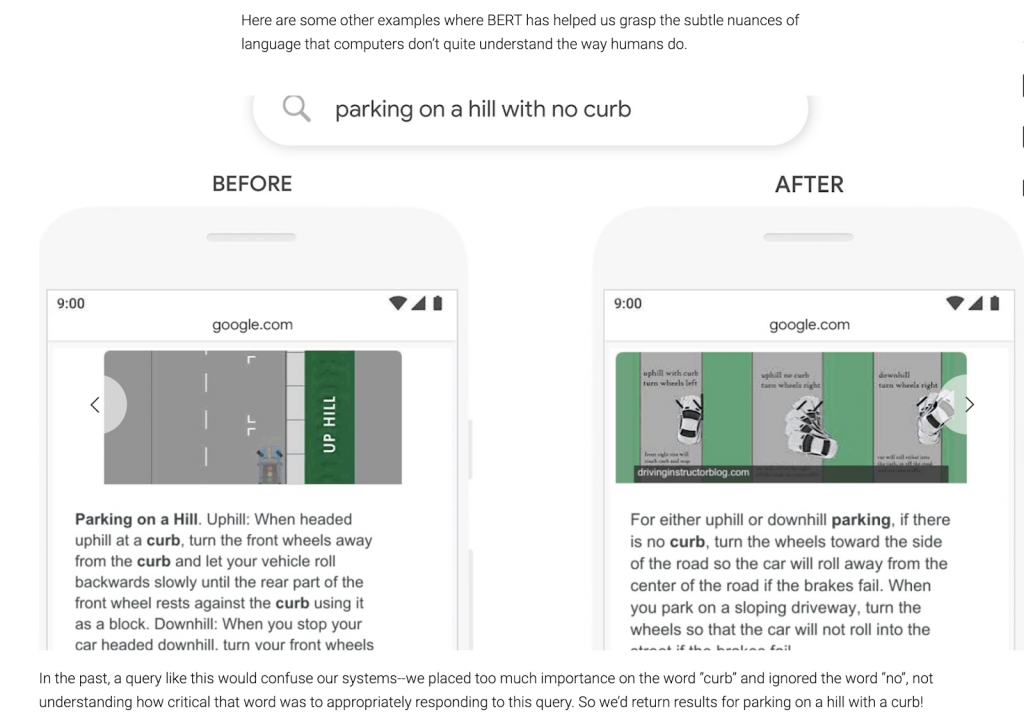
Why are featured snippets important?
Featured snippets are gaining importance for a variety of reasons.
Exposure
A study by Ahrefs, found out that users click on the snippet on average 8.6% and on the second result 19.6% meaning featured snippets don’t get more clicks for now.
It’s important to mention that this study doesn’t take into consideration Desktop vs Mobile CTR and keyword intent, so we highly encourage you to determine the actual CTR of featured snippets in your industry (more about this on our research section).
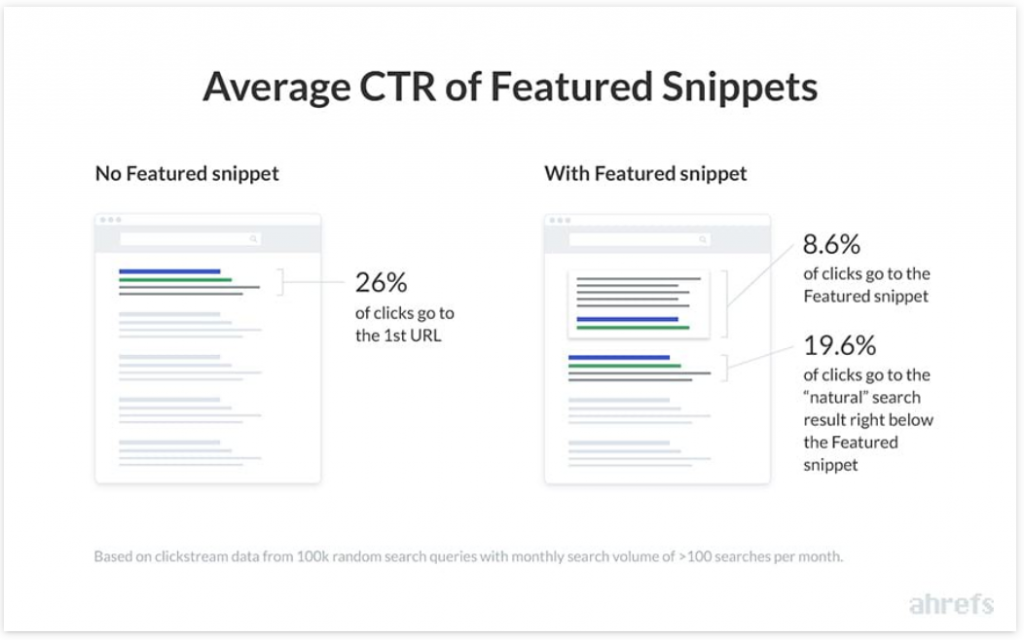
Adaptability
According to Danny Sullivan from Google, Featured snippets offer value to searches that are more suitable to mobile and voice devices. Considering the growing percentage of people using voice assistants and mobiles for their searches, featured snippets will get your business the competitive advantage it needs to keep acquiring users in the near future.
User Curated
Context and semantics is something that machines struggle with and Google knows that. That’s why user feedback plays a crucial role in improving the overall quality and accuracy of featured snippets.
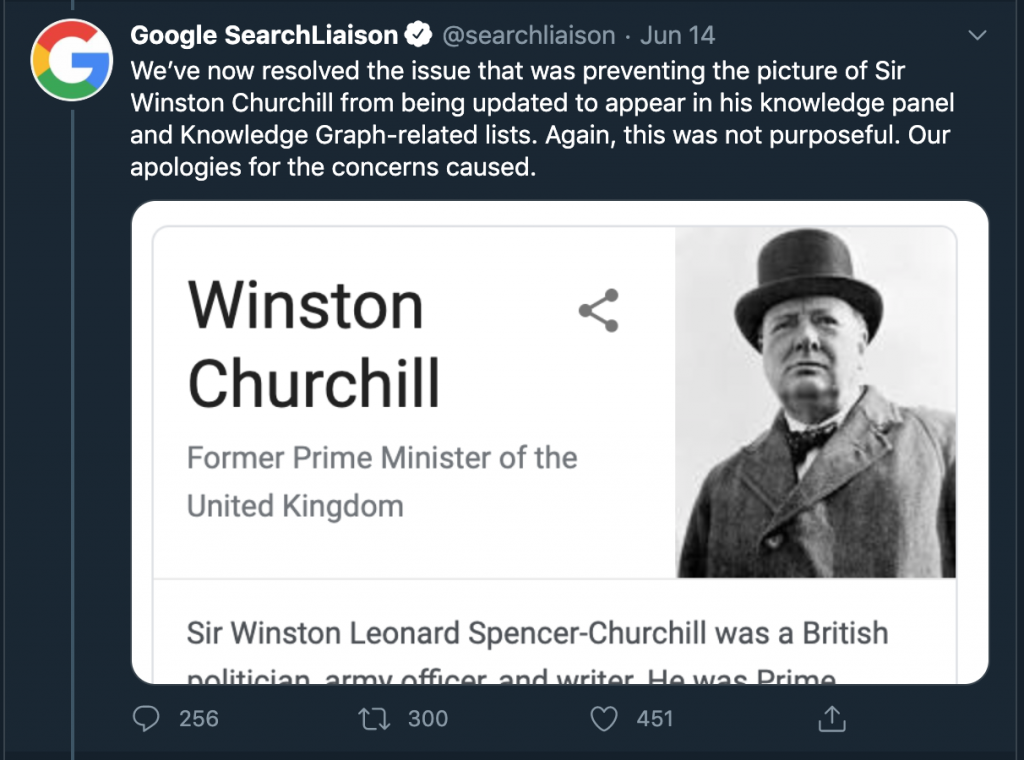
What are the business benefits of feature snippets?
Marketers and business owners can expect two main benefits from featured snippets.
Direct benefits
Branding: Appearing as a feature snippet increases brand awareness even among users who may not click on the link.
CTR: Being featured on top of the search results page with a snippet of your content has the potential to significantly improve your click-through rate. Some studies suggest a 2x improvement while others suggest a 5x improvement.
As mentioned above, we highly recommend capturing your own data because CTR data varies between verticals and industries.
Indirect Benefits
Traffic: Organic traffic increases after being featured. Multiple sites have reported traffic increases as a result of featured snippets — though again, traffic grow will depend on your industry and vertical.
Conversions: More traffic and click-throughs normally translate into more conversions.
OMG’s Research
We have used SEMrush Keyword Magic Tool & Ahrefs keyword research tool to identify SERP Feature Opportunities and trends around 3 industries. We then prioritized 1 topic per industry:
- Finance: Home Loans
- Telecommunications: NBN Plans
- Health & Beauty: Moisturiser
We then tried to:
- Establish the number of Keywords triggering Feature Snippets
- Establish SERP Feature patterns per industry
- Determine the organic opportunity for keyword triggering featured snippets within Ads
We then filtered out the data to focus only on websites that are currently triggering featured snippets for those topics in Google Australia
You’ll find a summary of some of the most important findings below. Wanna get the full research? Reach out to me on nicolas@onlinemarketinggurs.com.au.
Data Breakdown
Here’s a breakdown of the total number of keywords SEMrush & Ahrefs provided for each specific niche
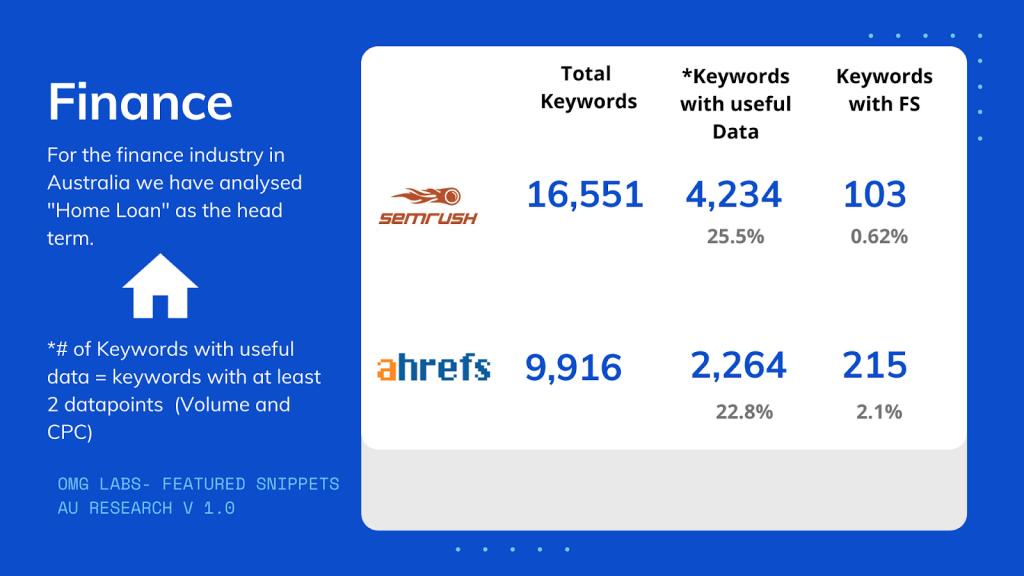
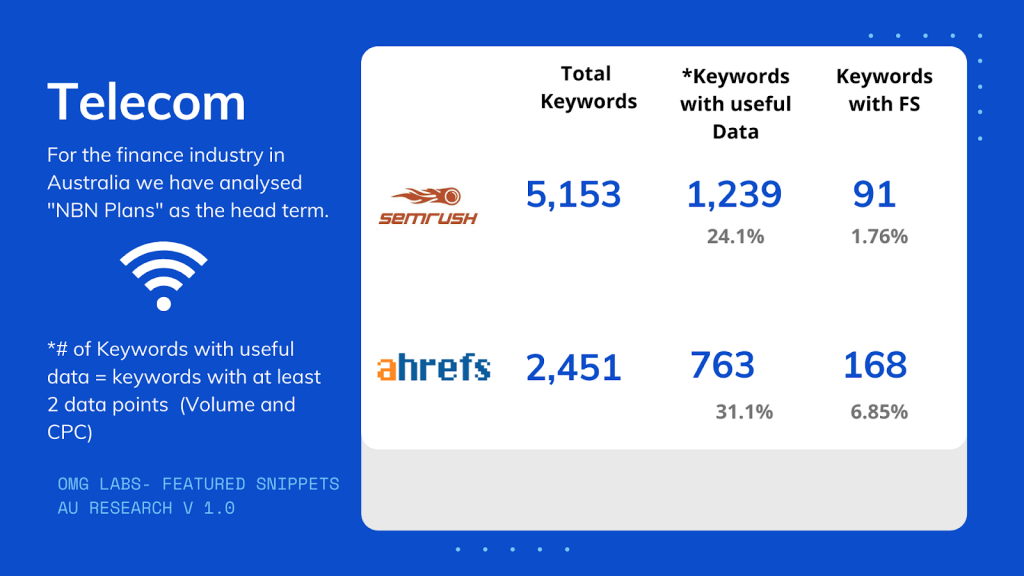
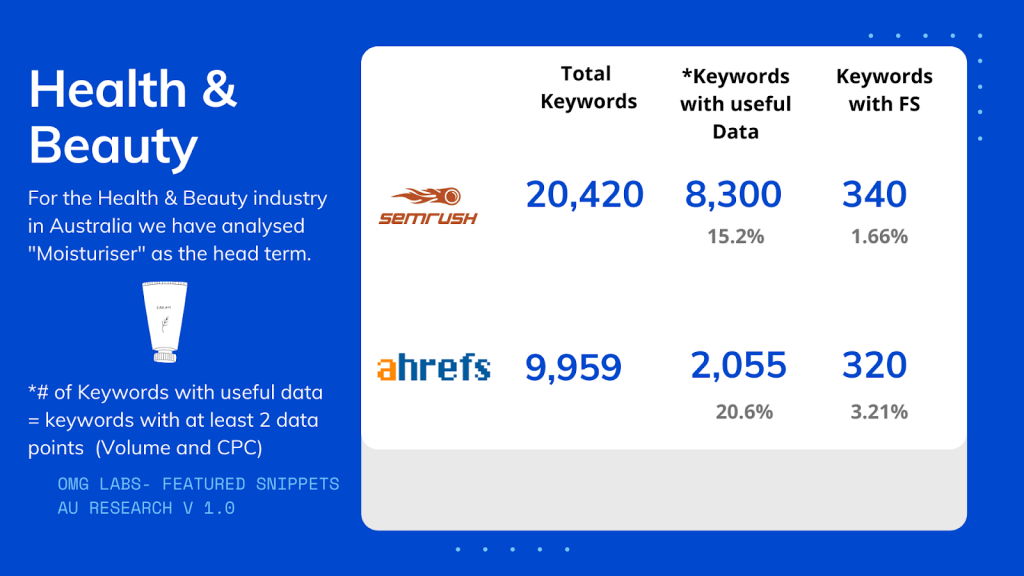
As you can see, almost 80% of the keywords provided by both tools did not provide any sort of data other than the keyword itself (CPC, Volume).
In general, Keywords triggering Featured Snippets rage between 0.6% to 7% of the total number of keywords found per niche
Keyword buckets
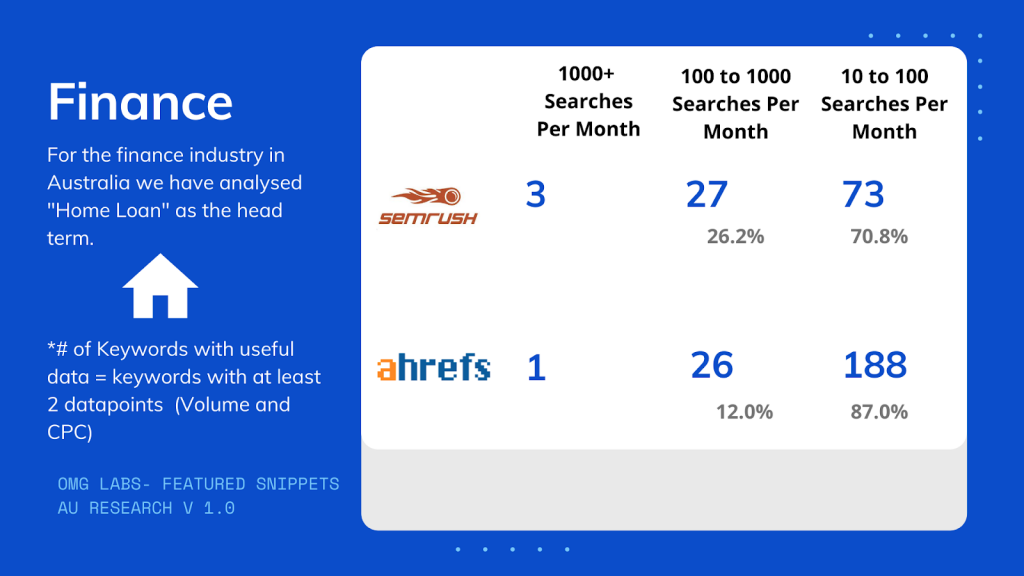
Search Behavior Per Bucket
- Head – Informational – General Type of loans i.e refinance home loans
- Middle – Navigational Intent (Specific Type of loans and Brand reviews i.e 5% deposit home loans & tic toc home loans review)
- Long tail – Transactional Intent (Brand + Product Name i.e anz exit fees on home loans)
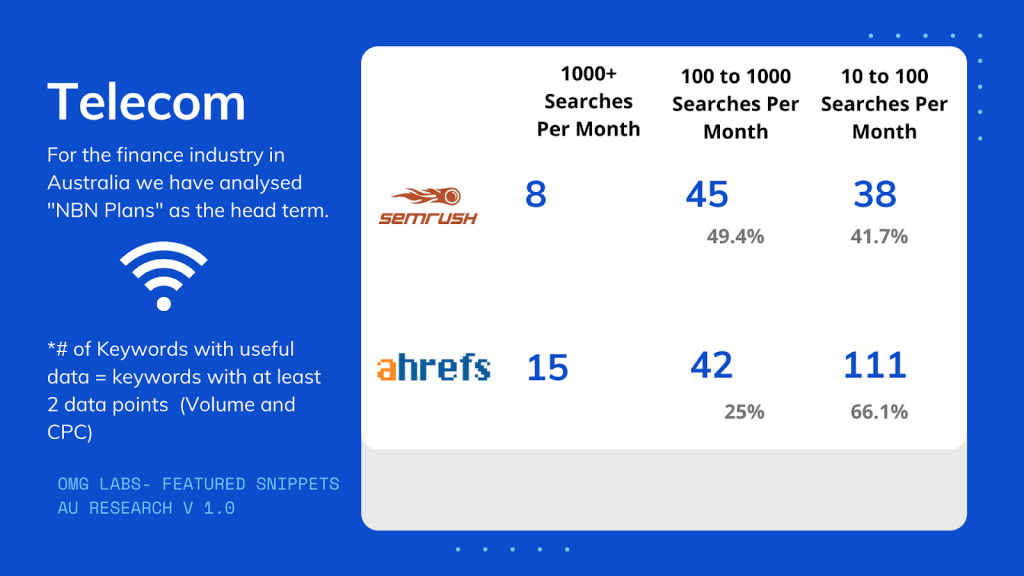
Search Behavior Per Bucket
- Head – Informational – General NBA plans & comparisons i.e best nbn plans and compare nbn plans
- Middle – Navigational Intent (Location Based Plans and Brand plans/reviews i.e best nbn plans adelaide and belong nbn plans)
- Long tail – Transactional Intent (Brand + Product Name i.e anz exit fees on home loans)
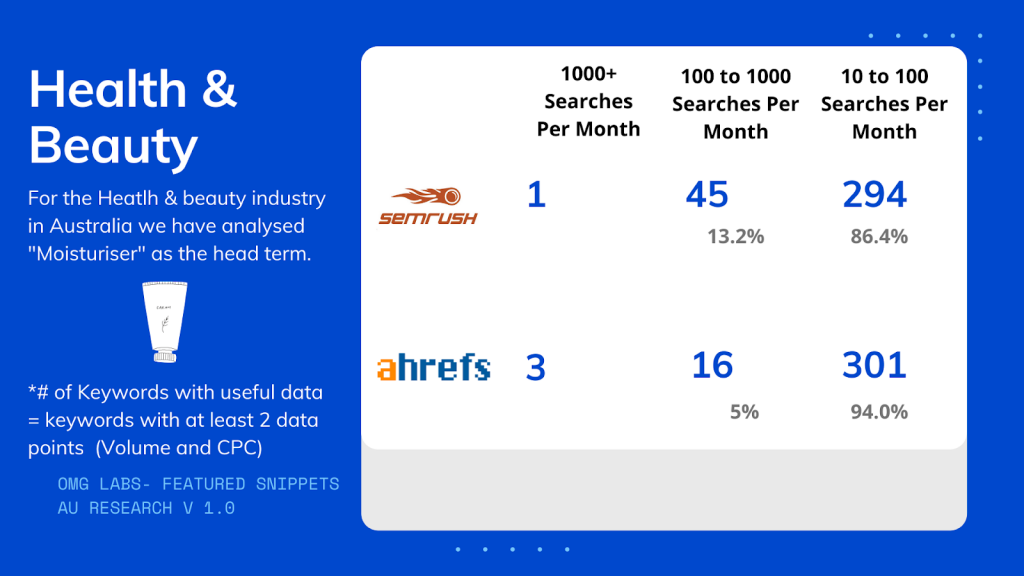
Search Behavior Per Bucket
- Head – Informational – General Moisturisers & Popular Body parts Variations i.e best moisturiser and best face moisturiser
- Middle – Navigational Intent (Skin Types & Ingredients Variations i.e best moisturiser for dry skin and best tinted moisturiser australia)
- Long tail – Transactional Intent (Brand/Reviews & Specific Conditions i.e sukin super greens moisturiser review)
Winners
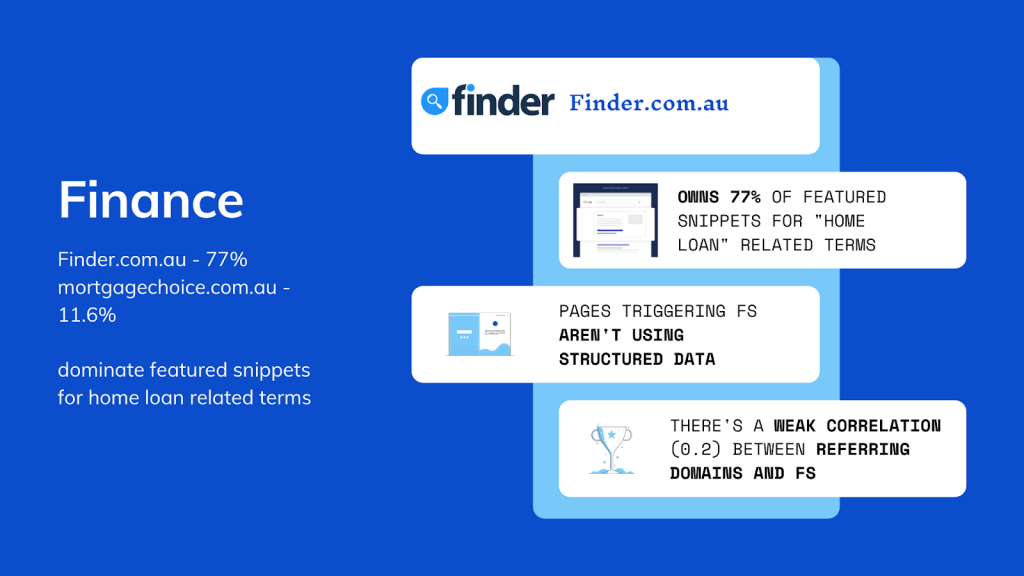
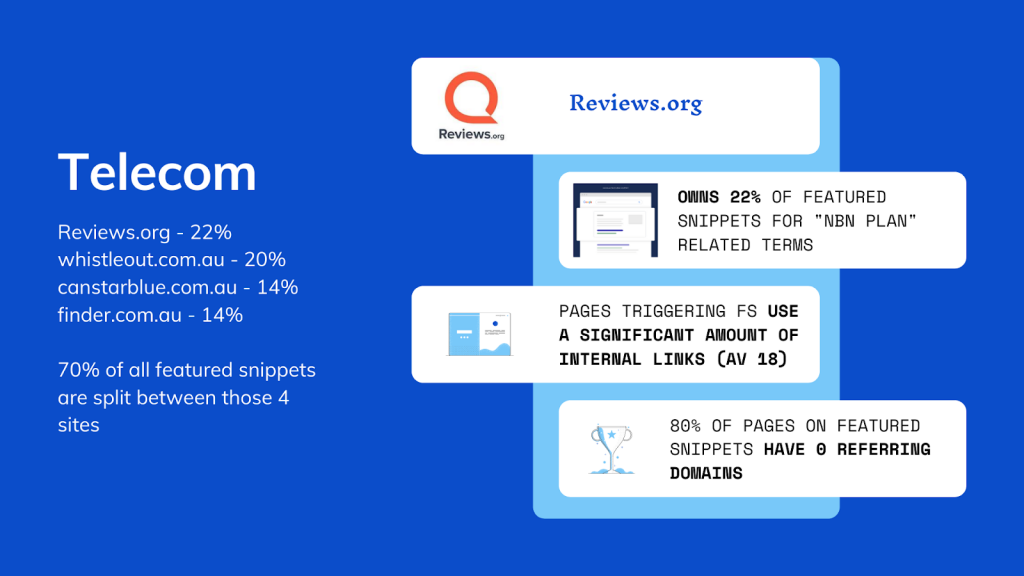
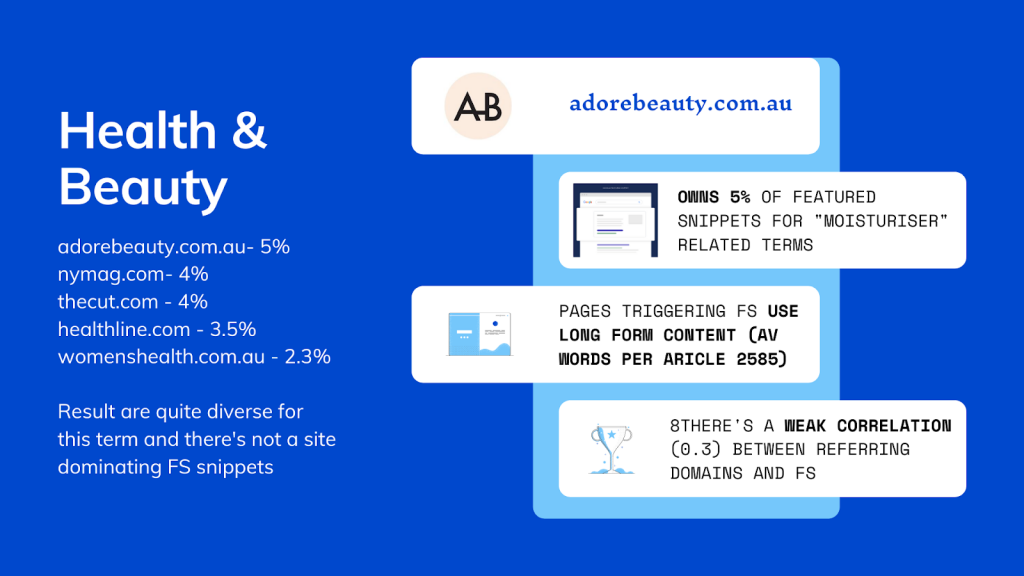
As mentioned above this was just a quick summary and if you want to have access to the full research piece you should reach out to me on nicolas@onlinemarketinggurs.com.au
Advice: How to Get Your Content to Appear on Google’s Featured Snippets
I have developed a framework you can use to optimize your content to appear as a feature snippet in search results. This framework consists of 3 critical areas for your business.
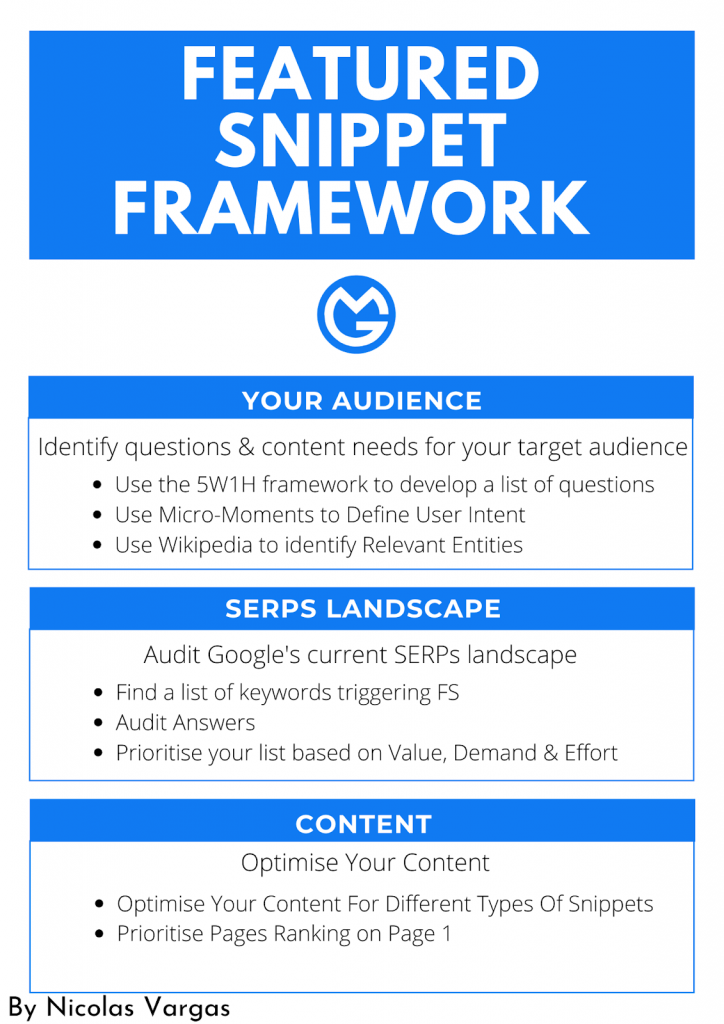
Below you’ll find a step by step guide, including tools and a copy of our framework, you can use to get started

Here’s a link to our framework on Google Sheets
Know Your Audience
In this section we explore the questions and content requirements for the group of people you want to engage with your marketing message
Know Your Audience & Answer their Questions
According to Google “Featured snippets are most likely to show up when your search is in the form of a question”
Use the 5W1H framework to develop a list of questions that will be essential for your target audience in the sales process
- What
- Why
- Where
- When
- Who
- How
With this framework in mind, it’s time to think about how to map out your user needs to your content and how you can tailor your content to suit these question formats.
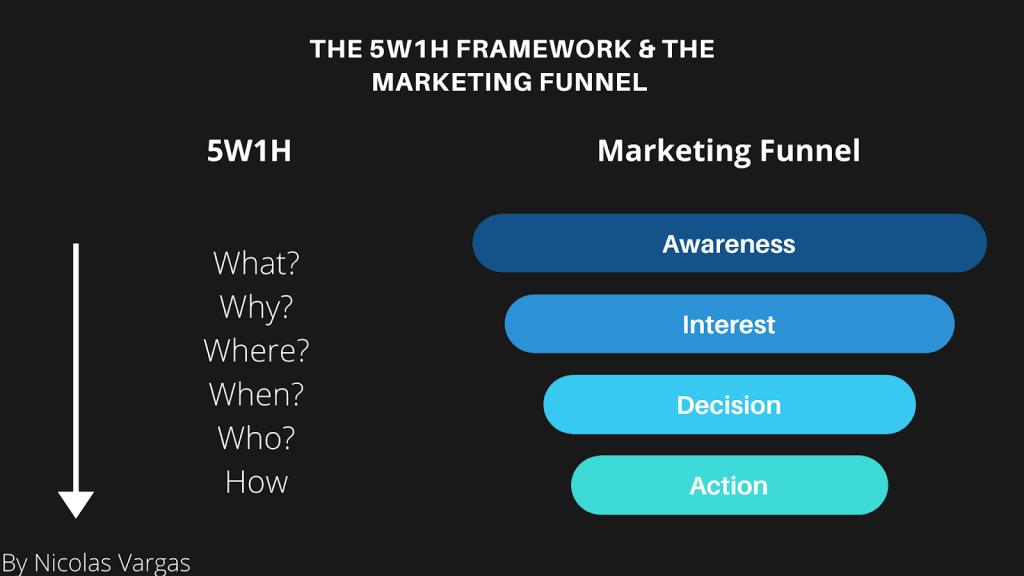
Pick a broad topic like “marketing” and break it down into different questions, then map out those questions to your marketing funnel and the user journey.
In general the deeper your question the closer to intent to conversion
Use Answerthepublic to find relevant questions
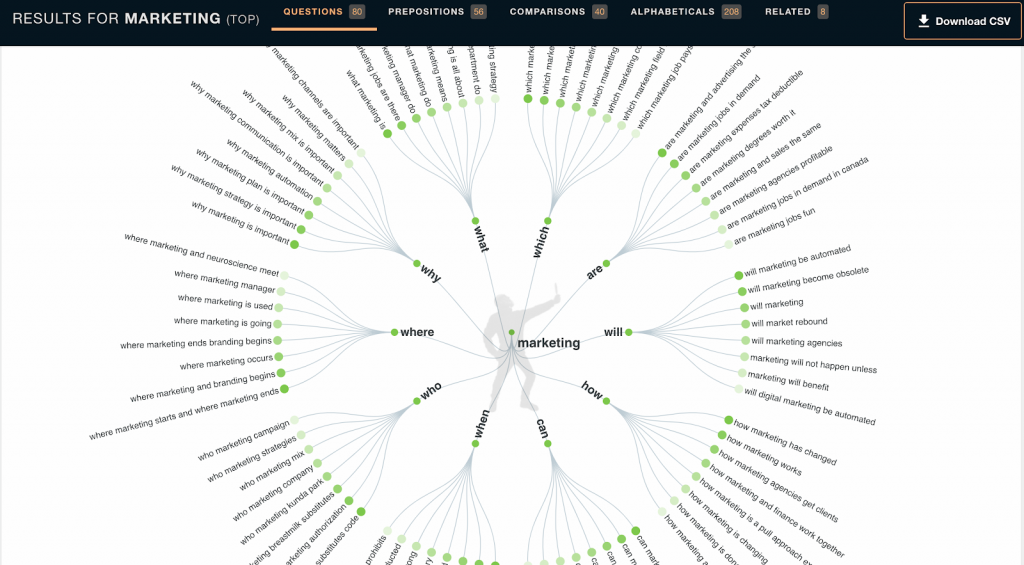
Alternatively, go to Google search box and type a question that you think your audience members would enter.
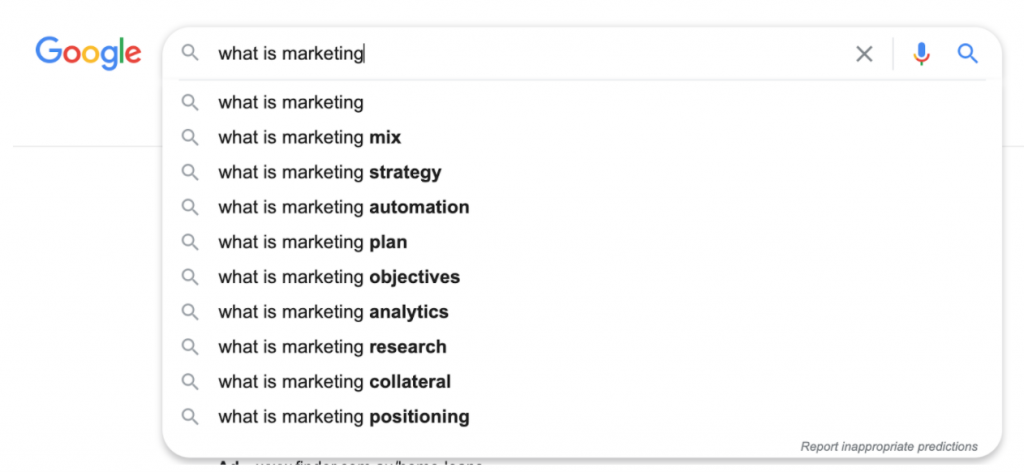
Keep Your User’s Intent in Mind
In 2016, Google introduced Micro-Moments as a tool to develop marketing strategies that are align to consumer needs & decisions
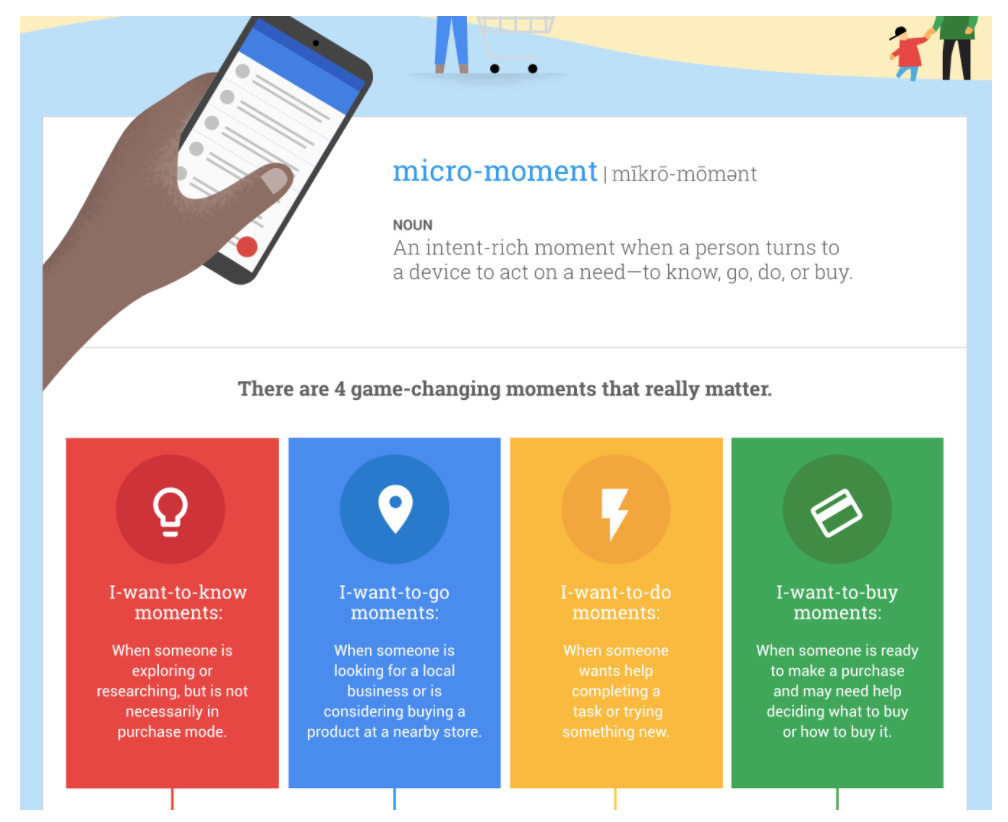
Ever since then, Google has used search intent as a critical factor to rank content and present SERPs.
Google has experimented with different types of featured snippets to cover “multi-intent” queries. These multifaceted snippets are designed to answer queries that have multiple interpretations and aim to cover more query types over time as a way to enhance user experience within Google search.
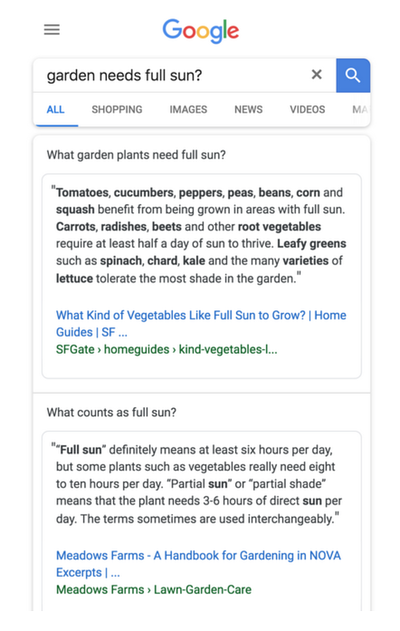
As you can see, intent is one of the important aspects of search so make sure you always take into consideration intent when optimizing your content.
Here’s how we have included intent to our framework:
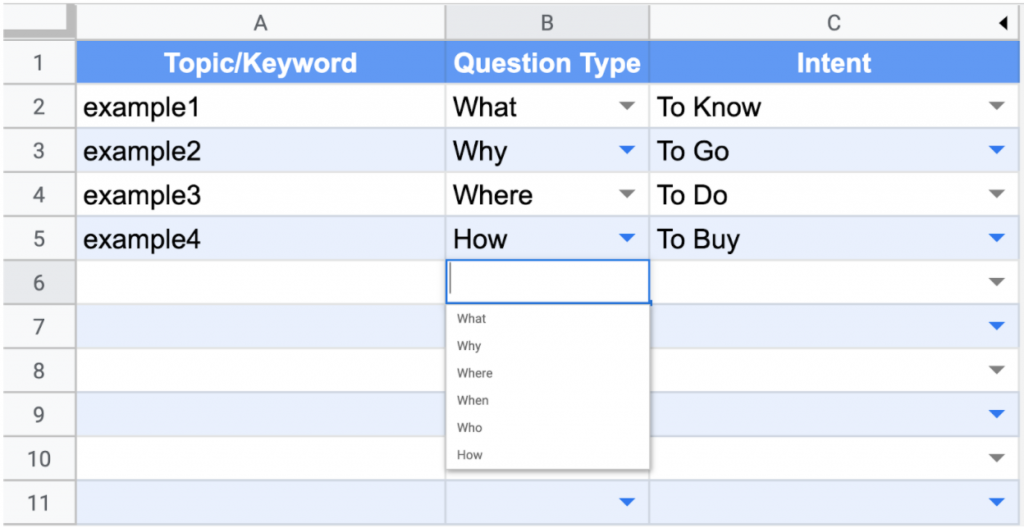
Include Relevant Entities & Answer Related Questions
By answering related or indirect questions that are relevant for your industry or vertical, you’ll be able to provide valuable content covering a topic from different angles. This will allow you to provide aggregated value and depth to your content, which will help you build trust with prospects as they will perceive you as an objective and reliable source of information.
From a search engine perspective, adding related questions will help search engines establish connections between multiple entities. The more you help Google better understand these links, the more trust and authority you’ll get from the Search engine.

The easiest way to find related entities is to go check a wikipedia page relevant to your industry.
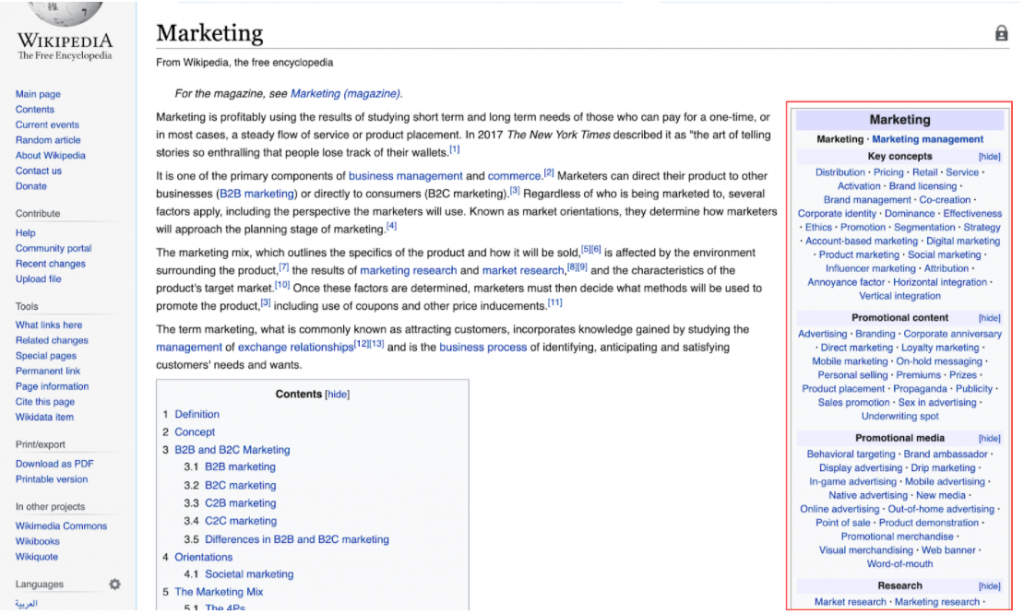
The easiest way to find related questions to your content or industry is to look at Google’s People Also Ask section.
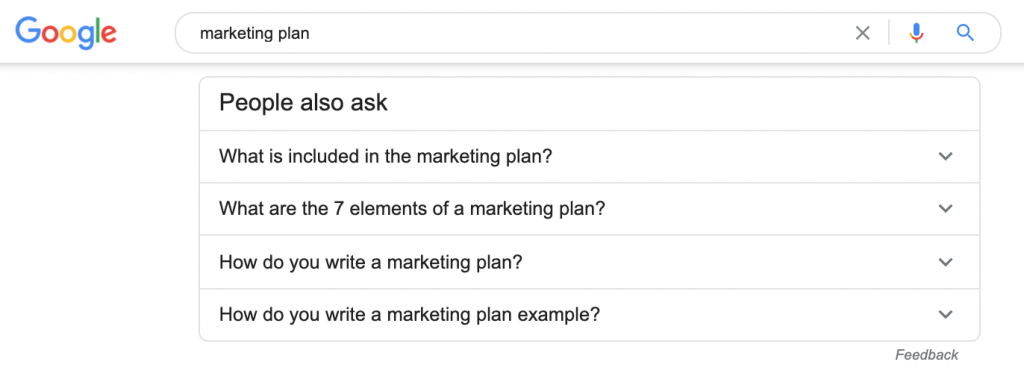
Here’s how we have included related questions to our framework:

SERPs Landscape Audit & Prioritisation
In this section we explore the SERPs landscape your audience is currently experiencing for the queries they’re currently searching for.
Review SERP Landscape
The Appearance of featured snippets in SERPs is becoming more and more common which constitutes an opportunity for marketers to obtain benefits from them.
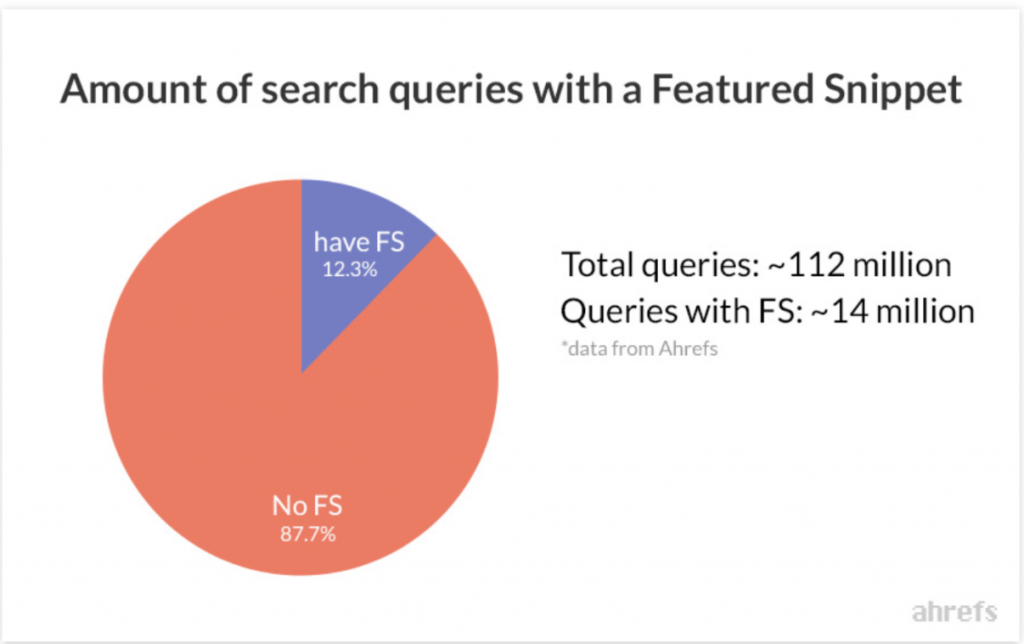
In order to optimize your content for featured snippets, you need to have a good understanding of the number and type of queries that are currently triggering featured snippets in your industry or vertical.
Here’s how you can do that:
- Find a list of key keywords triggering FS
- Audit Answers
- Prioritise your list based on Value, Demand and Effort Required
How to find Keywords Triggering Featured Snippets
The first thing you need to do is to create an inventory of phrases with search result pages already triggering a Featured Snippet. This will get you an idea of the type of keywords Google is using to show Featured Snippets.
There are 2 ways to look for SERPs that have a Featured Snippet.
- Manually: Using an incognito tab and then Searching each keyword one-by-one. Suitable for small sites
- SEO Tools: You can use a tool SEO tools to speed up the process. Suitable for large sites.
Keep in mind that at this point in time Google Search Console isn’t providing a reporting tool for featured snippets.
You’ll have to use third-party tools to dig into them. Here’s a list of he most popular ones
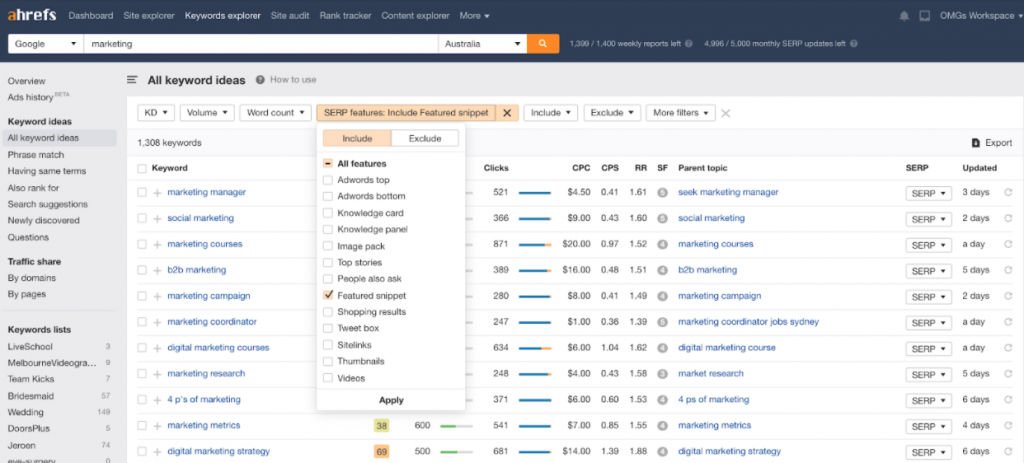
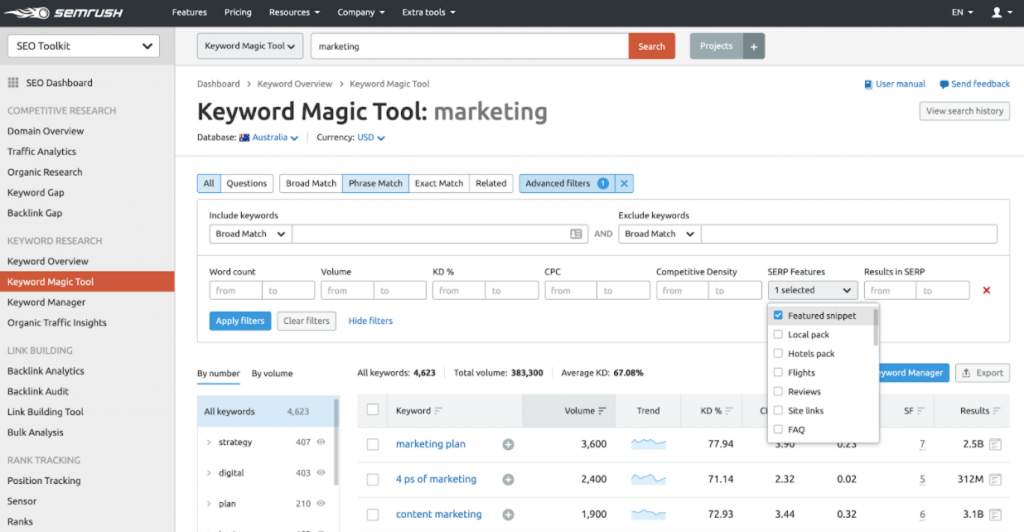
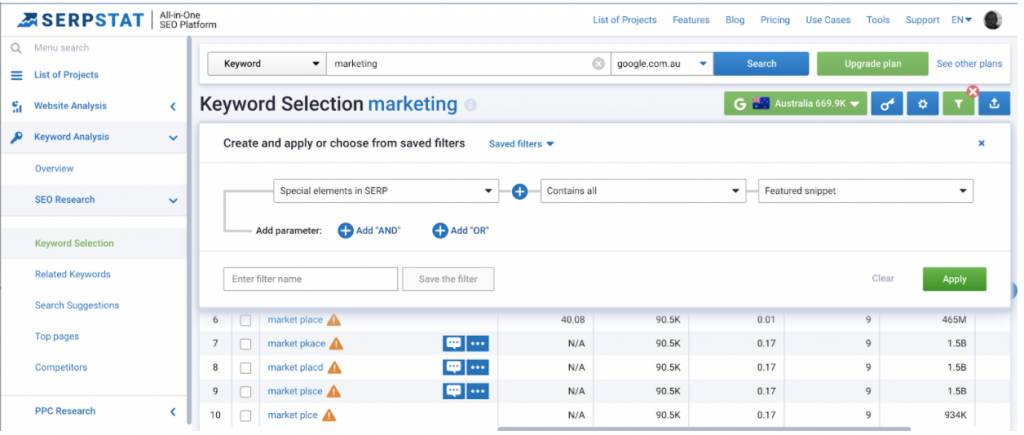
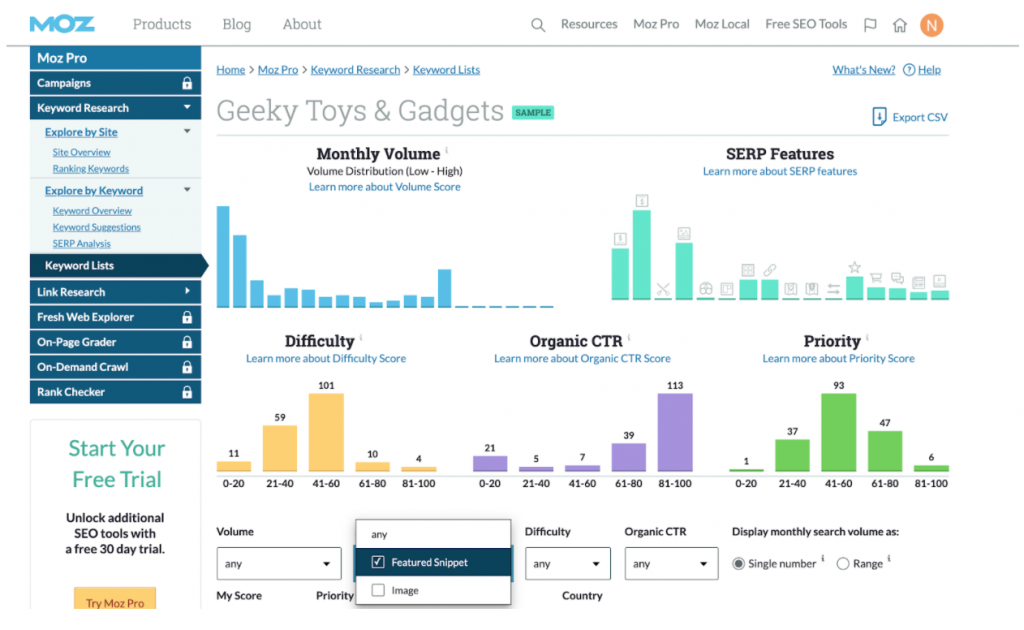
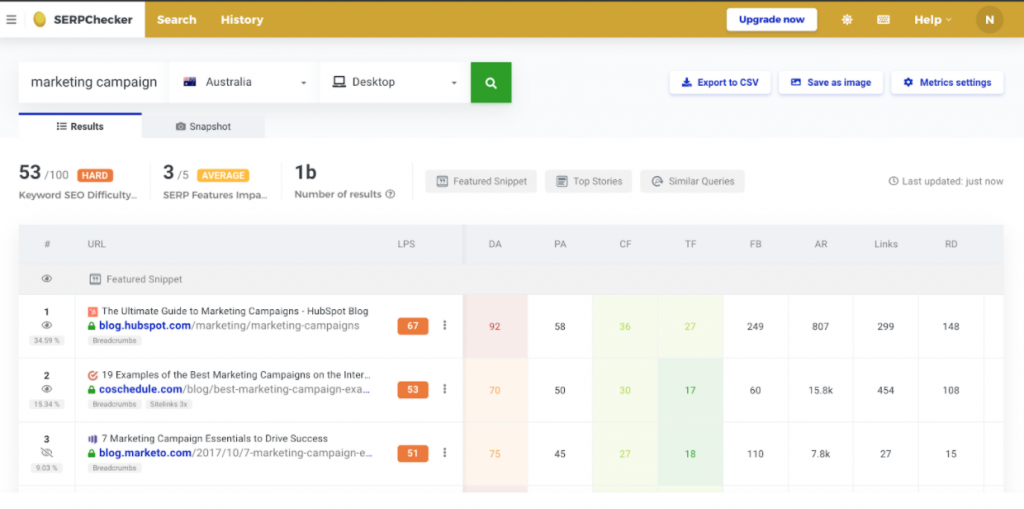
Once you have a list of keywords triggering FS, it’s time to identify the types of Snippets Google is showing up for each term:
- Text or paragraph
- List
- Table
- Video
- Multi Faceted
This information will help you prioritize and outline the first steps on your optimisation plan.
Don’t underestimate the value of images
Some featured snippets display images, these images come from a different website than the text portion of the snippet. Google normally picks the top ranking image on Image Search.
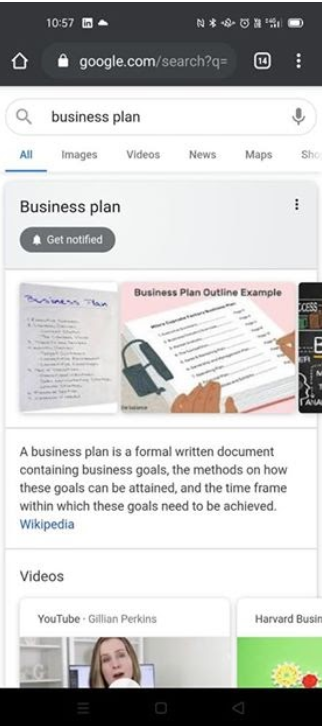
So to optimize images on featured snippets you’ll need to make sure your image ranks at the top of Google Image search for your targeted keyword
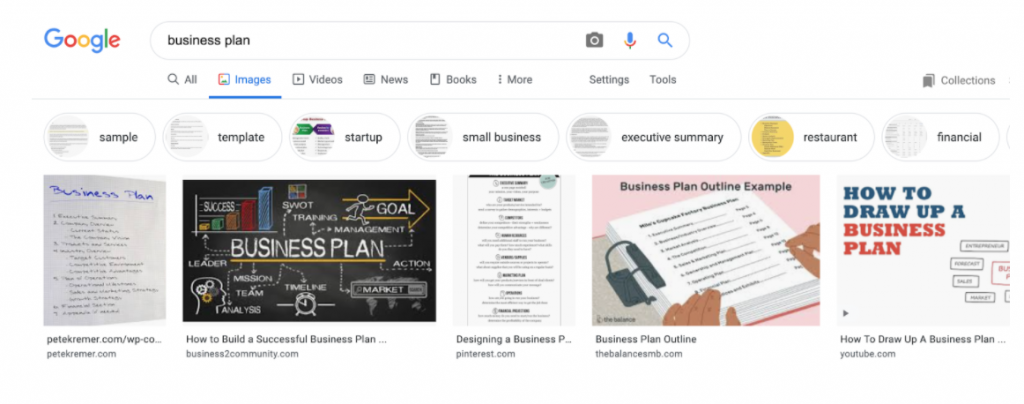
Here’s how we included snippet types to our framework
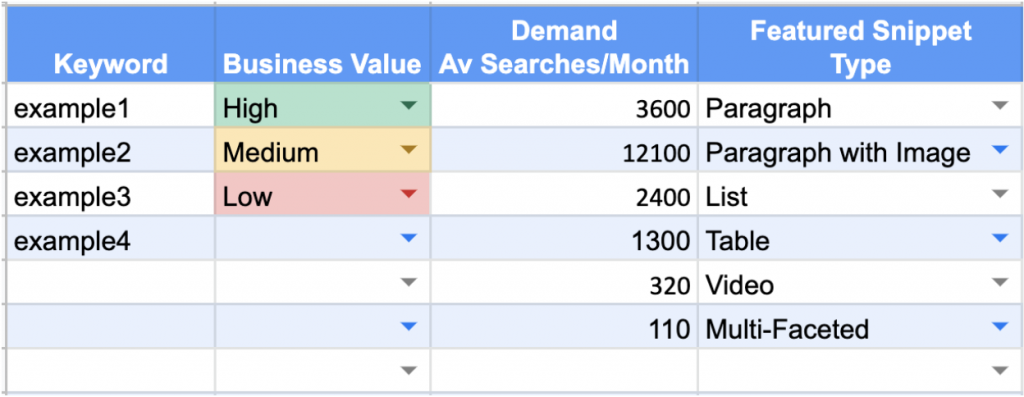
Audit the current snippet & provide a better answer
Perform an audit of content triggering featured snippets for your targeted keywords evaluating and discover “gaps” in that content you can improve upon.
You can identify opportunities gaps by checking Google search results and look for 5 types of opportunity gaps. (I have adapted this approach from Chis Vol Wilpert Editorial Calendar For Bloggers)
- Freshness Gap: How long ago other posts were published.
- Quality Gap: How good other posts are written (this includes content structure & layout)
- Authority Gap: How established other sites are.
- Relevance Gap: How well the blog post meets the search intent of the user.

Prioritisation
Prioritise your efforts based on the following criteria:
- Business Value: You want to trigger features snippets only for keywords that will help you acquire, retain or convert users.
- Demand: Triggering a Featured snippet for a question nobody is asking won’t be beneficial for your business
- Input time: How long does it take you to get things done?
Keep in mind that this is a dynamic process, that you need to perform on an ongoing basis (I recommend you to do it at least once a quarter).

Content Optimisation
In this section, we establish actions to leverage featured snippets for queries that are relevant for your target audience
Optimise Your Content For Different Types Of Snippets
Identifying and sometimes matching Google’s preferred format is critical when it comes to featured snippets.
That said, it’s always a good idea to propose an alternative format for featured snippets that don’t provide users with a good answer to their questions.
Here’s how to optimize your content for the 4 most popular types of Feature Snippets.
Paragraph: Make sure you provide a short snippet of text answering the question you’d like to get into the Featured Snippet Box. It is a good idea to provide context so your answer can trigger Featured Snippets for Multiple questions.
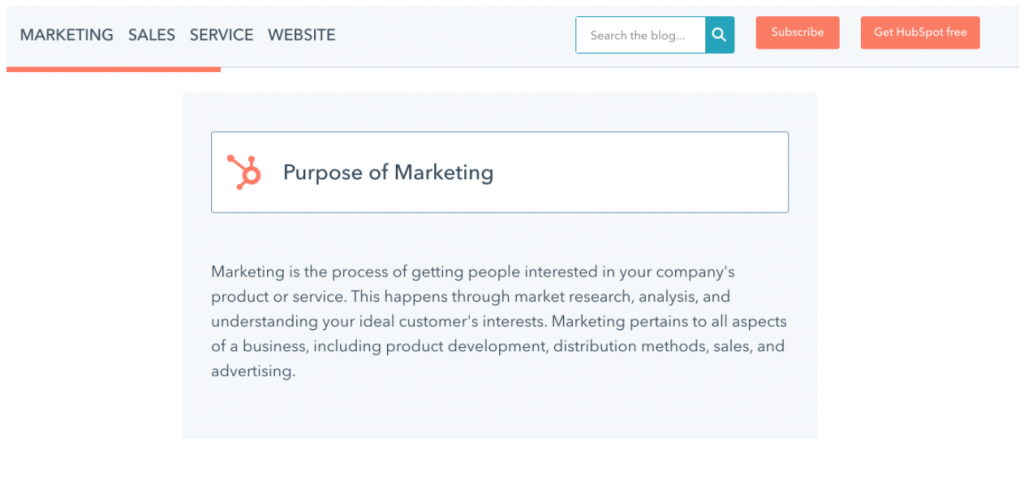
Table: Google tends to get content from HTML tables, however they sometimes pick the info from plain text or list and present it as a table – I recommend you to use HTML for keywords triggering this type of FS.
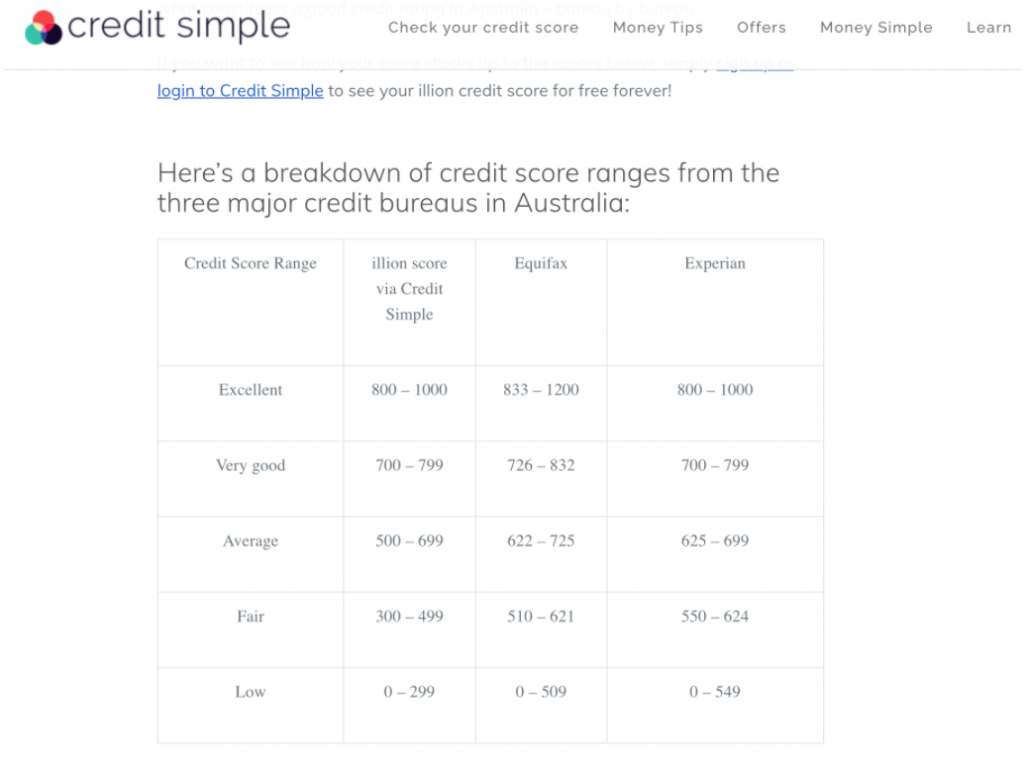
List: Add a section within your content with specific steps or lists of items so Google can easily pick them up.
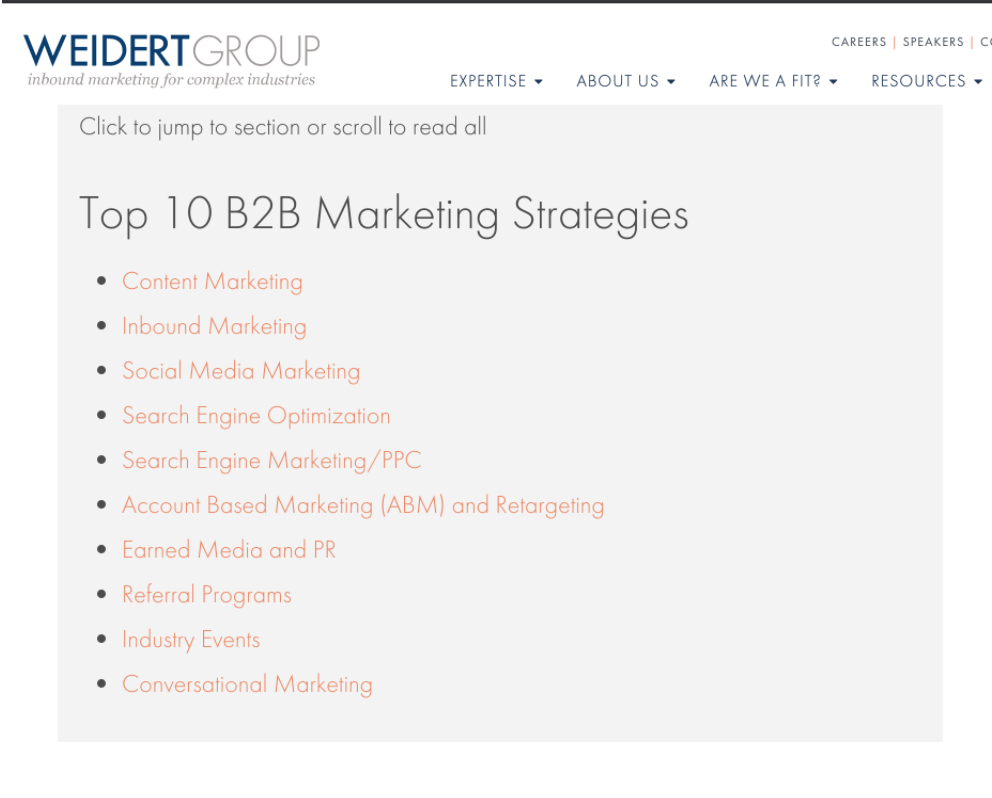
Video: Add video schema markup to your video content.
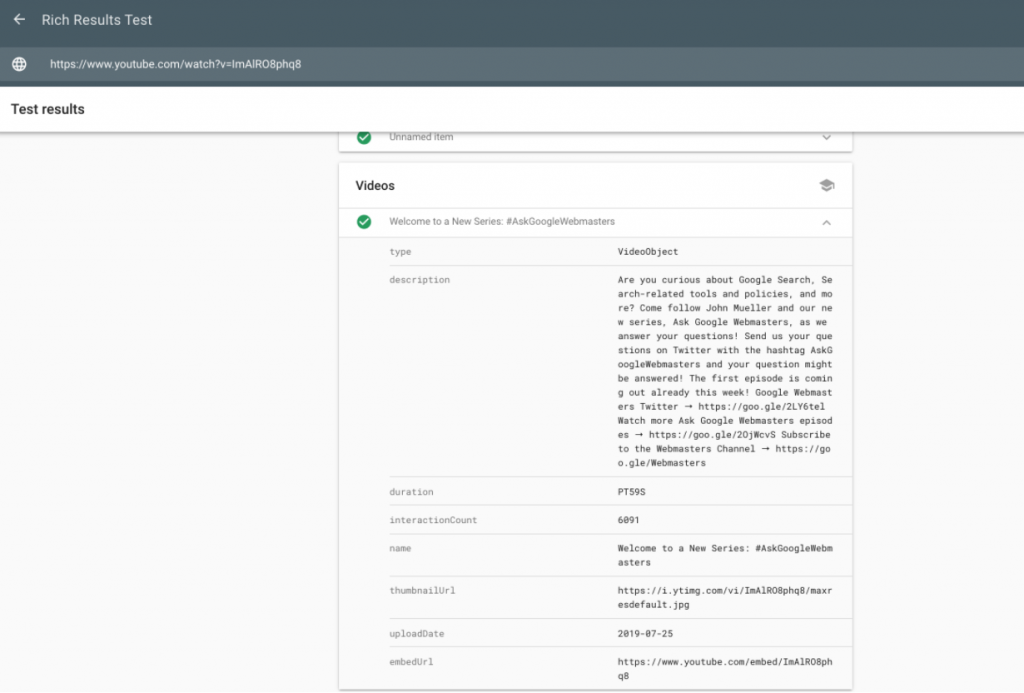
In general, make sure your answers are clear and easily accessible on your page. Use subheadings to tag each question you’re aiming to rank for and briefly answer it.
I highly recommend you to include external sources to support your answers, avoid opinionated answers without an authoritative source backing it up.
Prioritise Pages Ranking on Page 1
Now that you know how to optimize your content depending on the type of Featured snippet Google is triggering, you’ll need to look at the pages already ranking in page 1 that are not being featured.
The easiest way to do this is by using one of the tools mentioned above
Semrush
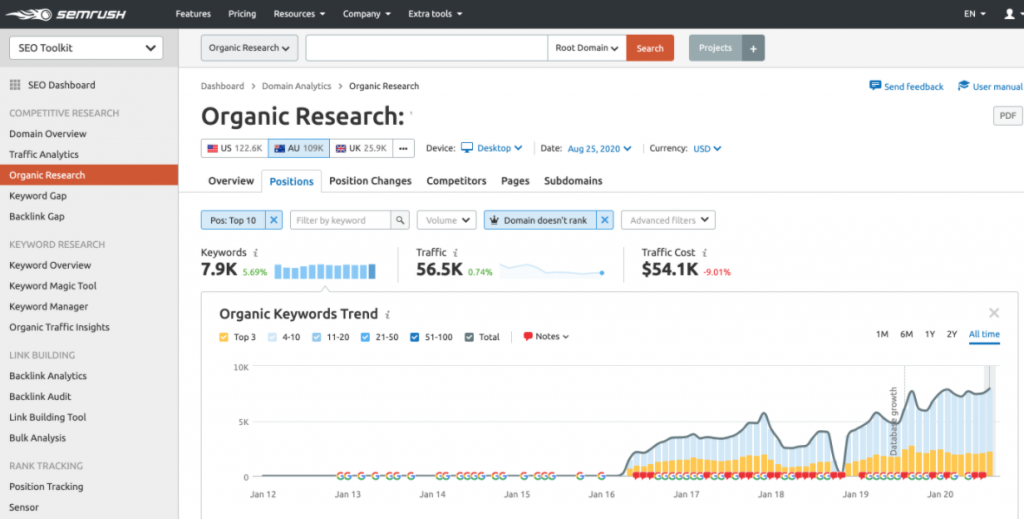
Ahrefs
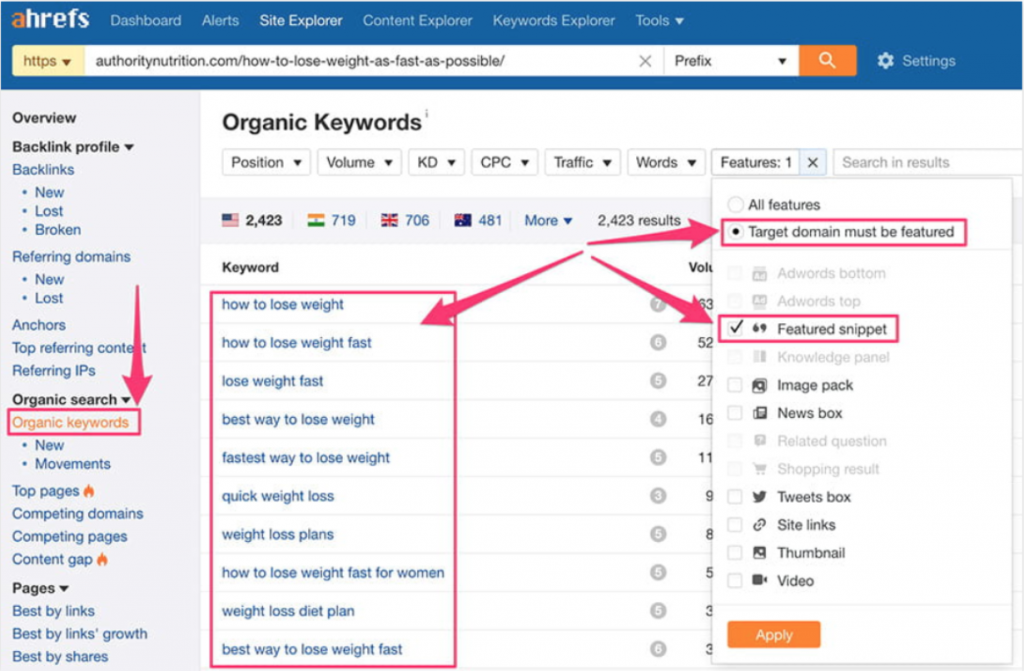
By identifying pages ranking on page 1 for keywords triggering featured snippets, you can prioritize your optimisation efforts.
Please note that Google uses content from page 1 to generate featured snippets. So, if your site doesn’t have many pages ranking on page one, you shouldn’t prioritize featured snippets optimisation. Instead, prioritize ranking improvements for pages ranking on Page 2 & 3.
As a rule of thumb make sure your content:
- Provides value to the end user ( relevant, convenient, helpful, and accessible)
- Provides a Good Structure
- Matches the user intent for the keywords you are optimizing for
According to Allison Reinert of ALR Marketing Solutions, before you set your sights on the featured snippet, optimize your content to rank on page one of the search results for your target keyword(s) and that Virtually all featured snippets are generated from the top 10 results.
Make sure your site isn’t preventing Google to show up Featured Snippets
According to Google there are 2 ways to prevent Featured Snippets
- Text marked by the data-nosnippet tag won’t appear in featured snippets (or regular snippets either).
- Those who wish to retain snippets in regularly-formatted search results but not appear in featured snippets should experiment with setting the max-snippet tag to lower lengths. Featured snippets will only appear if enough text can be shown to generate a useful featured snippet.
I recommend you to experiment with data-nosnippet to specify sections of your content you’d like Google to prioritize for Featured Snippets. By excluding other parts of the content you help Google identify the best content on your page for featured snippets
What about Structured Data?
As of August 2020, there is no a specific structured data markup that directly influences featured snippets. Google Search uses structured data to understand the content of your site, as well as enable special search result features and enhancements.
Monitoring Featured Snippets
Monitoring Rankings
As mentioned above there are 2 ways to monitor rankings featured snippets
- Manually Check SERPs in Incognito and record positions overtime (Not Recommended)
- Rank tracking tool: All the tools mentioned above let you monitor Featured Snippet rankings for a group of pages/keywords over time on desktop and mobile.
Monitor Performance
Click through rate at a keyword Level
Using Search Console you’ll be able to determine which keywords are potentially bringing traffic to your page as a result of a featured snippet
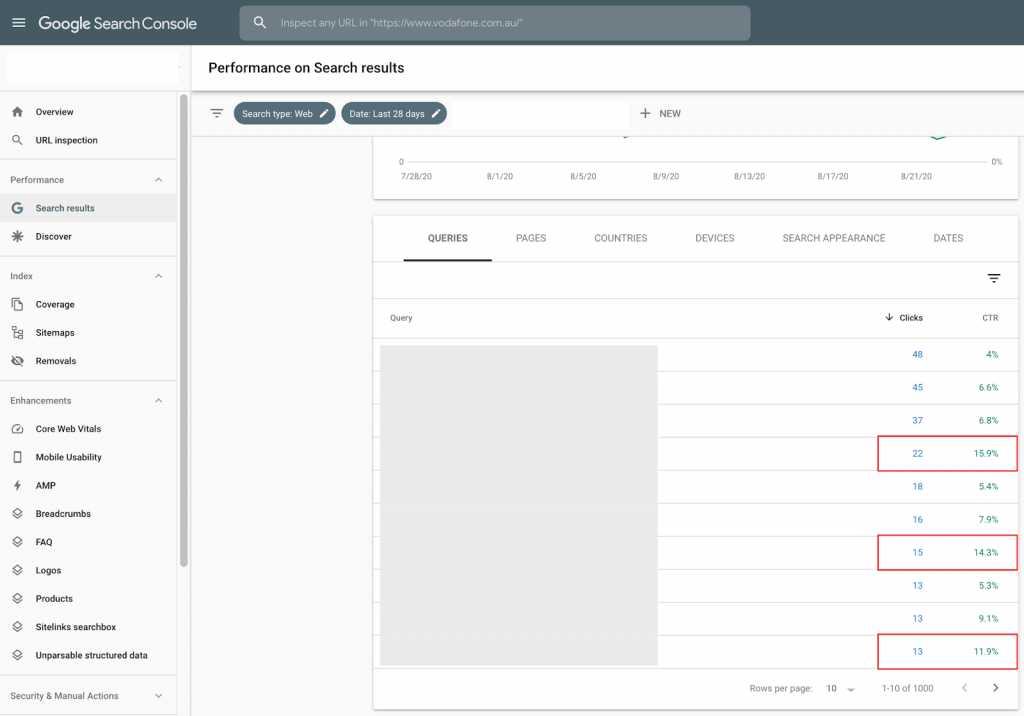
Based on my experience CTRs from featured snippets tend to be > 10%. However I encourage you to gather your own data as this figure might be different for your set of pages/keywords and industry.
Monitor Organic CTRs & Conversion Rates
Linking Google Analytics and Search Console will allow you to gather CTR data and establish correlations between organic CTR and Conversions.
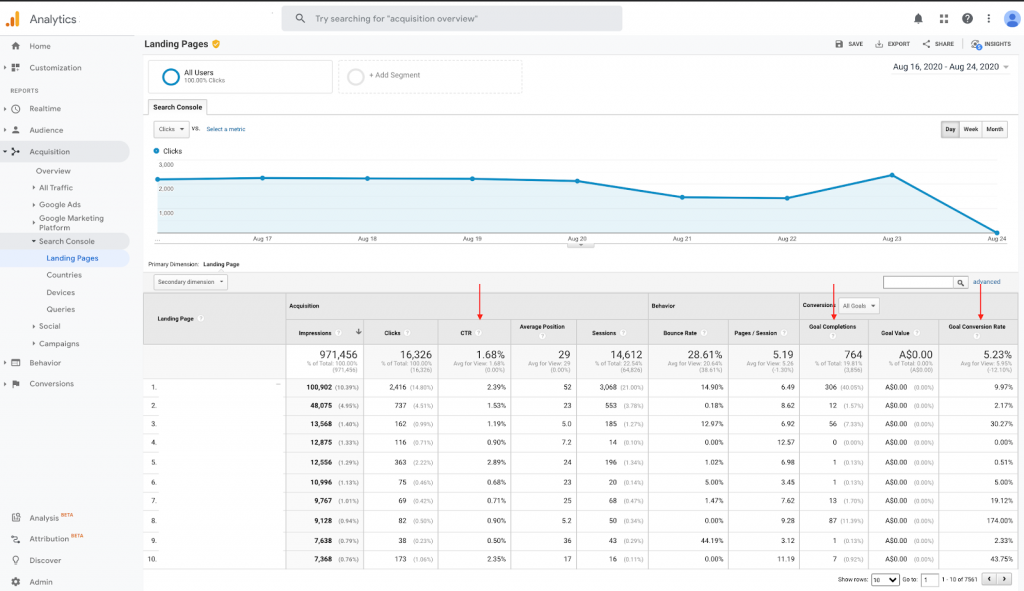
By monitoring CTRs before and after a page triggers featured snippets will help you understand the business impact of it.
Tracking Scroll to Text via Google Tag Manager
Bodie Clark created a very handy step by step process to track Featured Snippet Clicks via GTM – This process tracks how many users access the “Scroll to Text Fragment” Google generates when people click on featured snippets.
Here’s an outline of the whole process
- Create a custom Javascript variable within Google Tag Manager
- Connect GA with your new variable via Custom Dimensions
- Access your new report via ‘Behavior’>‘Site Content’ > ‘All Pages’. And use the ‘Secondary dimension’ drop-down and search for your new Custom Dimension.
Closing thoughts
As a constantly evolving Search Feature, Feature snippets can significantly increase brand awareness and traffic to your site. Like any new technology developed by Google, it requires constant experimentation and an extra investment in terms of time and resources for business to be able to get significant results.

